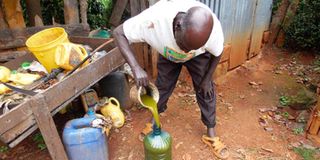Organic farming improving farmers fortunes, income

Jeremiah Wainaina at his organic farm in Tharaka Nithi mixing Tithonia liquid fertiliser.
Dressed in a white T-shirt and a black trouser, Jeremiah Wainaina picks up an old empty plastic container at Kithanjeni village Chuka and fills it up with a yellowish liquid that seems like dirt. The stench, however, reveals that it’s no ordinary dirty water.
“This is Tithonia, a liquid fertiliser that I make after collecting leaves and twigs from fresh Tithonia. I cut them into smaller pieces, put the content into a plastic container and fill it with water before covering it and putting it in a shade for at least 21 days,” the 62-year-old father of four explains.
Once the content forms some black mass around the container, Wainaina knows that it is ready and can be filtered and diluted for use at the farms. The mixture can then be stored for as long as one wants after the 21 days of fermentation.
Tithonia, is not the only organic fertilisers that Wainaina makes. With a key aim of improving his ever dwindling coffee production, he also embarked on developing other organic blends from nature that function both as pesticides and as organic fertilisers. In coming up with the blends, he mixes different concoctions that range from shrubs, garlic, pepper, rabbit urine among others depending on the intended use.
His implementation proved him right, as his ever dwindling coffee production of less than a hundred kilos started bourgeoning. The production further shot to over a tonne in his 114 coffee plants, with the production per stem growing from less than a kilogramme to over ten kilogrammes Wainaina now aims at producing up to 20kgs of cherries per stem.
High production
Having embarked on farming in 2015 after his posho mill business in Kibugua market, Chuka failed, organic farming never disappointed him as the high costs of inputs and fertiliser had really weighed him down then.
His mastery in organic coffee farming has now earned him fortune and fame as many farmers flock in to source for both knowledge and get some organic fertilisers from his farm. He is also contracted by farmers to conduct spraying in their farms at an agreed rate depending on the distance and the size of the farm.
With organic farming, the coffee tree leaves and vegetables attained a dark green colour, an aspect he attests to being well nourished. He also managed to keep at bay the ever aggravating pests.
With such an assurance form organic farming, Wainaina confesses of managing to curb his reliance on chemical fertilisers that had impoverished his soils.
“The shrub: Tithonia, is a reliable source of Nitrogen, (N) Potassium (K) and Phosphorous for plant growth, and lack of Nitrogen hinders plant growth. Phosphorous is key for growth of strong plants and quality yields, as insufficient proportions cause stunted growth and wilting,” Wainaina explains.
“Good coffee husbandry matters, and to achieve quality production, coffee has to be managed perfectly well as it is gold and has the money minting possibilities,” he explains.
Though with high production in organic farming, Wainaina advises that there should be willingness to adjust and patience, as growing anything organically is more than just leaving the chemical fertiliser and other agro chemicals.
“It may take years to build the fertile soils, maintain productivity, establish a balanced biodiversity in the face of disease, pest and climate change, without the use of agrochemicals,” he says.
Wainaina further compounds his farming by use of green manure, which he says has the potential to replace the inorganic minerals in excess of what the inorganic fertilizers provide.
Enriching the soil
Teresa Ndirangu, a trainer at College of Sustainable Agriculture for Eastern Africa (CSAEA) expounds that use of compost manure enables a farmer to return the organic matter back to the farm, thus enriching the soil and allowing it to hold water for a longer period while providing nutrients to the crop.
Ndirangu further advocates for plant diversification and crop rotation as to improve utilisation of nutrients, expel pests and break the cycles of diseases.
In encouraging other farmers to use the liquid Tithonia fertiliser, Wainaina says that the liquid has a high concentration of dissolved nutrients which are readily available for the plant, contains microorganisms that break down the organic matter in the soil enhancing the activity of the soil while increasing the nutrients available to the plant, and that it also acts as an insect repellent hence controlling insects and pests.





